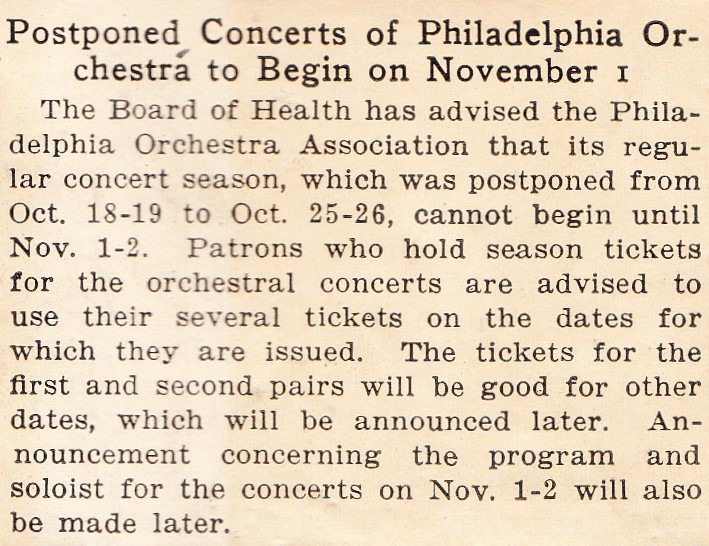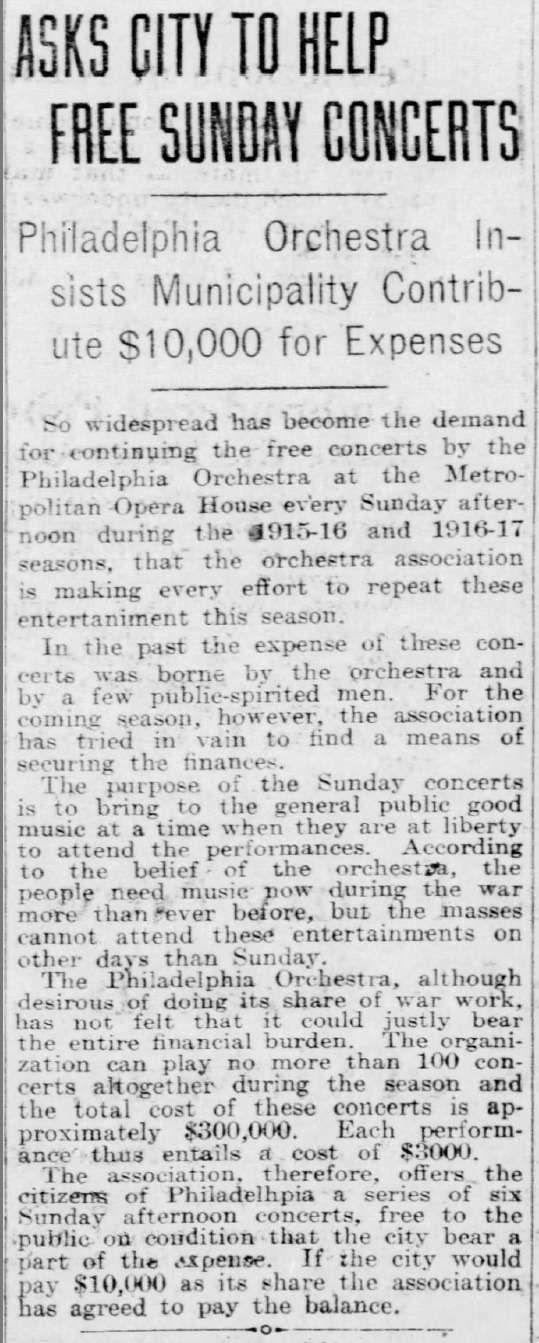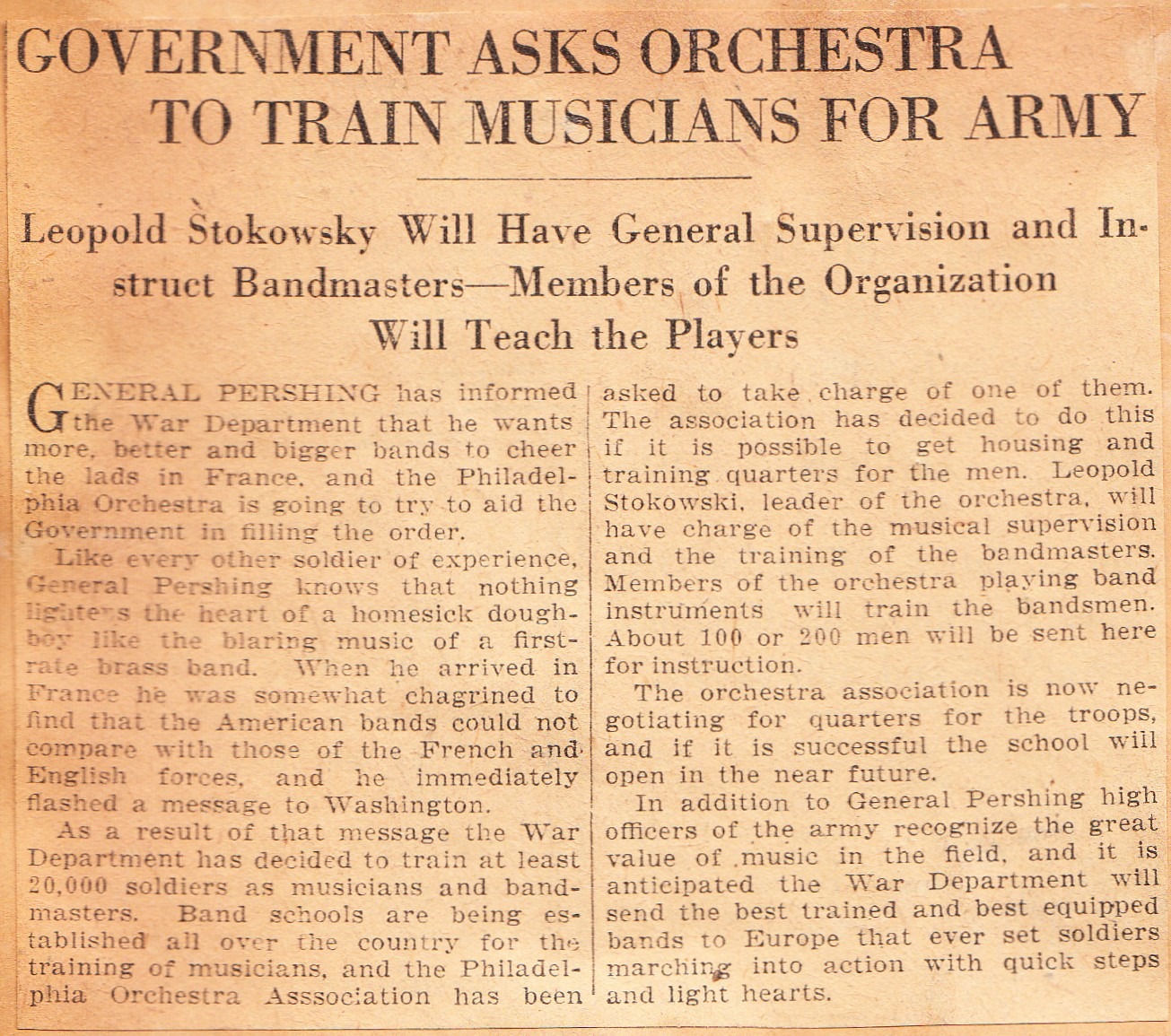The Philadelphia Orchestra has responded to crises many times over the course of its 120-year history. In times of need—from wars to sudden tragedies to pandemics—the Orchestra has done what it always does: offer the gift of music to the people of Philadelphia and to the world.
Indeed, the Orchestra’s founding can be traced to a pair of benefit concerts given in the spring of 1900 for the families of those killed in the Spanish-American War. Conductor Fritz Scheel, who had recently led a series of well-received concerts in Philadelphia, assembled an orchestra of local musicians for the benefit concerts. It was this ensemble, with Scheel on the podium, that became The Philadelphia Orchestra six months later, giving its inaugural concert on November 16, 1900.
In the ensuing years, the Orchestra continued to respond in trying times. It helped to sell war bonds, and gave a series of free concerts during World War I and at local USO clubs during World War II. When President Kennedy was assassinated in 1963, CBS turned immediately to The Philadelphia Orchestra. At the network’s request, Music Director Eugene Ormandy and the Orchestra taped a memorial concert of Brahms’s Song of Destiny and German Requiem the day after the assassination that CBS broadcast nationally that evening. In more recent times, Music Director Wolfgang Sawallisch and The Philadelphia Orchestra gave a moving free Tribute Concert at the Mann Center on September 16, 2001, following the catastrophic events of September 11; the concert was broadcast to more than 20 cities across the country. Less than a week later, Sawallisch and the Orchestra went ahead with their United States Tour, bringing the healing power of music to audiences in nine states.

Music Director Wolfgang Sawallisch and the Orchestra perform the National Anthem at the September 16, 2001, Tribute Concert. Photo: Coy Butler
Of course, the Orchestra also helps Philadelphians, and the world, celebrate in happier times as well, such as its concerts during the U.S. Bicentennial in 1976 and its performances on the Benjamin Franklin Parkway during Pope Francis’s visit to Philadelphia in 2015. More locally, its Free Neighborhood Concert series brings classical music to communities throughout the Philadelphia area on a regular basis.
But it is in difficult times that music can be especially important.
The closest historic parallel to the current coronavirus crisis is the influenza epidemic of 1918, which hit Philadelphia in mid-September. The U.S. was then in the midst of World War I and on September 28 the city held a large public rally to promote the sale of war bonds. Within days, thousands were infected. By early October, all public events in the city were banned, but the damage had been done. Philadelphia would eventually become the hardest-hit city in the nation, with some 12,000 deaths.
The opening of The Philadelphia Orchestra’s 1918–19 season, originally scheduled for October 18, was postponed until November 1. Technologies such as we have today to share music with the public remotely during a shutdown were not available at that time. Recording of orchestral music was then in its infancy and radio did not come into widespread use until the 1920s. With all public gatherings banned, there was little The Philadelphia Orchestra could do but wait for the season to open.

Article in Musical America announcing the delay in the opening of the Orchestra’s 1918–19 season.
What the Orchestra did, however, was rehearse throughout the two-week delay. (While public gatherings were banned, private activities such as music rehearsals were not, even those with 100 musicians!) One music critic noted that the Orchestra benefitted from the additional rehearsal time, as it allowed the ensemble to work through the difficult modern works Music Director Leopold Stokowski was renowned for programming.
While The Philadelphia Orchestra had no means to share its music publicly in 1918, throughout the World War I years it did contribute to the broader war effort in a variety of ways, both musical and financial. The Orchestra sponsored a booth on Broad Street to sell war bonds and the local newspapers regularly reported on the considerable sums it raised. The Orchestra also gave a series of free concerts at the Metropolitan Opera House on North Broad Street during the war. After financing the concerts itself for several years, The Philadelphia Orchestra Association asked the city to help defray the costs. As the Philadelphia Inquirer reported in October 1918:
So widespread has become the demand for continuing the free concerts by The Philadelphia Orchestra at the Metropolitan Opera House every Sunday afternoon during the 1915–16 and 1916–17 seasons, that the orchestra association is making every effort to continue these entertainment[s] this season. In the past the expense for these concerts was borne by the orchestra and by a few public-spirited men. For the coming season, however, the association has tried in vain to find a means of securing the finances … According to the belief of the orchestra, the people need music now during the war more than ever before.

Philadelphia Inquirer article asking the city to help shoulder the cost of free concerts during World War I.
Toward the end of the war, Stokowski offered to train musicians in the U.S. armed forces, part of a nationwide effort to improve the quality of music in the military. Reporting on the “contribution of The Philadelphia Orchestra to the governmental machinery,” the Philadelphia Evening Public Ledger noted that “Stokowski will supplement his directorship duties with supervision of a school of some 200 bandsmen to be sent here for instruction.”

Philadelphia Evening Public Ledger article about Leopold Stokowski and the Orchestra helping train musicians for military bands.
As it has for over a century, The Philadelphia Orchestra will continue to offer great music to the public in times of need. Fortunately, it now has the technologies to share that music the world over.